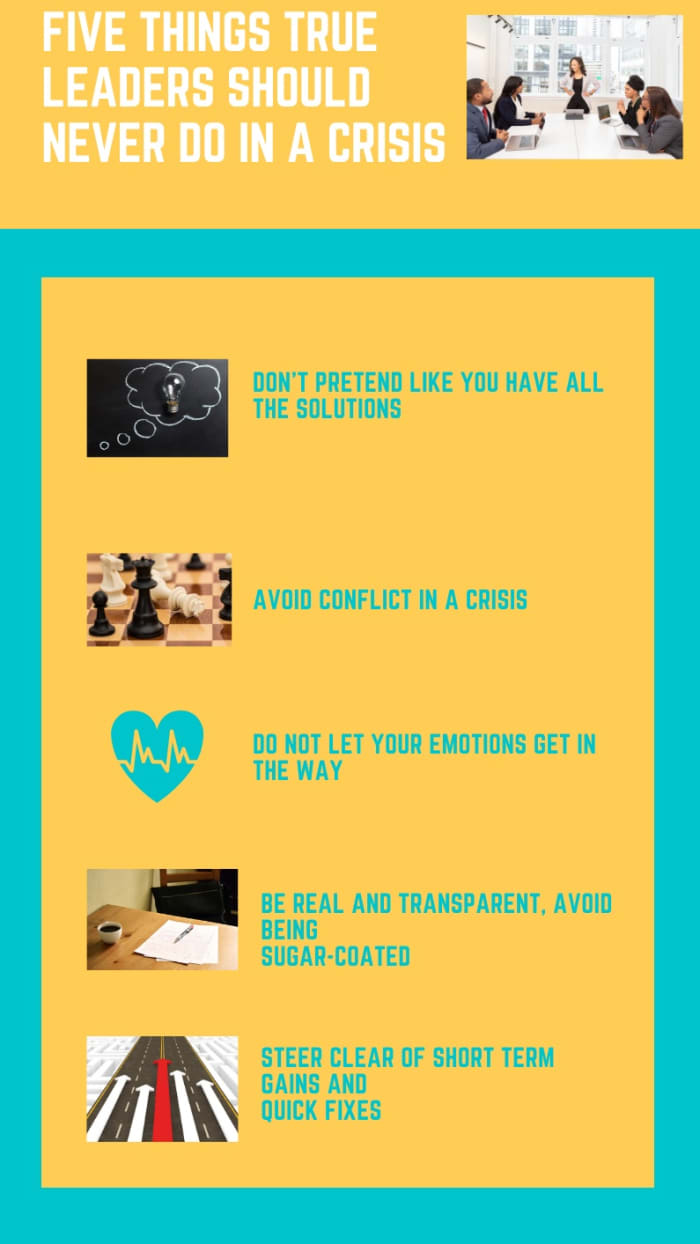Five things true leaders should never do in a crisis

The true test of leadership is how well you function in a crisis- Brian Tracy
The world is grappling with a crisis it has not seen before. And to steer the mass of humanity through this crisis, even the leadership has to reinvent itself. From being empathetic to communicating clearly to putting the greater good ahead of all other concerns, leaders have a responsibility to keep calm and try to maintain business as usual as much as possible while managing employee experience in such testing times.
We all know what a leader is expected to do in a crisis. In simple terms, as Chandra Ganjoo, Executive Director & Group CPO, Trivitron Healthcare puts it succinctly, “A good leader is the one who ensures the protection, assistance, and support to these employees as much as possible.”
In a crisis, a leader is expected to regularly communicate with the employees, empathize with them, ensure their safety, develop strategies to support them, motivate them, establish clear guidelines, ensure fair workplace practices are still followed, reward and recognize employees, and be honest and adaptable.
But what are those behaviors which a leader should clearly steer clear of in a crisis?
Don’t pretend like you have all the solutions
A leader cannot have all the solutions, crisis or no crisis.
Vivek Gambhir, Managing Director & CEO, Godrej Consumer Products Limited shares that in a routine situation, a top-down approach might work. But in a crisis like this where there is so much uncertainty and things are changing constantly, it is important for leadership to be distributed. So, have a clear direction, but also empower your teams on the ground to act fast.
“The temptation in a time of crisis is for leaders to put themselves at the center of all activity. Have the humility to avoid falling into that trap.”
Don’t micromanage. Instead, leverage all the support you can. Be clear about what needs to be escalated and ensure that you can mobilize resources quickly to support your team members.
Avoid conflict in a crisis
Crisis situations can be tough and pressurizing and a good leader will first and foremost think for the team. Rajendra Ghag, CHRO, Blue Dart Express Ltd. says, “The key is to keep your priorities intact and then act on it. I believe a leader needs to avoid conflicts at all costs and promote coordination and team spirit amongst teams.”
A crisis is not the time to indulge in conflict but to encourage company values to enable teams to work together and tide through the crisis. Leaders should have a clear communication approach. Vague and unclear communication only leads to confusion and panic, which should be avoided at all costs, especially now.

Do not let your emotions get in the way
A leader, at any cost, cannot lose their calm, even if they are feeling overwhelmed, believes Siddharth Mehta, CEO Freecharge. Employees look up to their leaders, and if they portray resentment, employees will lose confidence in them. Hence, it is important for a leader to demonstrate confidence and keep the workforce motivated.
It is all about having the right mind-set. There is no set rule that will help a leader during adversity but their experience.
During a setback, a useful perspective would be the one that doesn’t focus on negative outcomes alone but considers data, facts, actual causes, and channelizes those to conduct the management process, by involving people and showing the way. An unequivocal viewpoint of a leader displays reasoning and a sense of judgment to see things clearly as they are and not what they appear to be.
Guiding with a sense of calm is a mark of confidence and also provides strong support in continuing business functions amidst a challenging scenario.
Be real and transparent, avoid being sugar-coated
Leaders play a pivotal role in crisis management and it is quintessential for them to abide by certain dos and don’ts during the crisis. As per Nitin Mohan, Founder & Director, Blackberrys, one thing that a good leader should avoid in times of crisis is being sugar-coated. Leaders should be real and transparent in their communications to safeguard the trust of their employees in them. Leaders should be open about the evolving nature of the problem and avoid any miscommunication in this regard. There should be no sense of fear amongst them no matter how difficult the situation gets.
Steer clear of short term gains and quick fixes
A crisis is definitely not the time to look at short term gains, as per Ajay Tripathi, Chief Human Resource Officer, L&T Infotech. The company may be under intense pressure, but a leader should never make a decision contrary to what he has been living through while managing the crisis, in order to make a short term gain.
Thus a leader needs to avoid quick fixes of any kind in a crisis in order to not jeopardize the trust he was generating all through.
Lastly, as a leader is always at the center of everything, he can never demonstrate a loss of hope.












